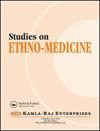Parengi Porja母亲的民族医学实践:印度安得拉邦东高特山脉的一个脆弱部落
Q2 Social Sciences
引用次数: 0
摘要
Parengi Porja是一个特别脆弱的部落人口(PVTG),一个居住在印度安得拉邦东高特山脉的土著和小人口。本研究的目的是详细介绍Parengi Porjas部落母亲的民族病因学、民族症状学、民族妇科和民族产科实践,以及服用民族药物的时间,以阐明她们在分娩后恢复健康的方式和疾病发作。人们还强烈相信辟邪的概念,辟邪可以帮助他们治愈疾病。将20种疾病分为轻度和重度,并分析了5种女性特有的健康相关做法。研究结果表明,这些做法是代代相传的,在文化上是可以接受的,有意义的,并在最早的时期为受影响的人提供了救济和照顾。医疗多元化也存在,但程度较低,因为要到达现代医疗设施需要时间、交通设施和极端气候条件,因为该地区容易发生大雨和旋风,而且与医生和护士之间也存在语言障碍。本文章由计算机程序翻译,如有差异,请以英文原文为准。
Ethnomedical Practices of Parengi Porja Mothers: A Vulnerable Tribe in Eastern Ghats of Andhra Pradesh, India
The Parengi Porja is a Particularly Vulnerable Tribal Population (PVTG), an aboriginal and small population inhabiting the Eastern Ghats of Andhra Pradesh, India. The objective of the study is to detail on the Parengi Porjas tribal mothers’ ethno-etiology, ethno-symptomology, ethno-gynecological and ethno-obstetrics practices, and the timings of ethnomedicine intake which elucidates their ways of regaining health after childbirth and the illness episodes. The people also strongly believe in the concept of warding off an evil eye and the evil spirits which in turn help them in curing their illness. Twenty illnesses were classified into mild and severe, and five female-specific health related practices were analyzed. The findings of the study show that these practices are passing down from generations and are culturally acceptable, meaningful, and provide relief and care to the affected person at the earliest period. There also exists medical pluralism but in less extent as reaching modern medical facilities, requires time, transportation facilities, extreme climatic conditions as the region is prone to heavy rains and cyclones and also have language barriers with the doctors and nurses.
求助全文
通过发布文献求助,成功后即可免费获取论文全文。
去求助
来源期刊

Studies on Ethno-Medicine
Social Sciences-Cultural Studies
CiteScore
0.50
自引率
0.00%
发文量
13
期刊介绍:
Studies on Ethno-Medicine is a peer reviewed, internationally circulated journal. It publishes reports of original research, theoretical articles, timely reviews, brief communications, book reviews and other publications in the interdisciplinary field of ethno-medicine. The journal serves as a forum for physical, social and life scientists as well as for health professionals. The transdisciplinary areas covered by this journal include, but are not limited to, Physical Sciences, Anthropology, Sociology, Geography, Life Sciences, Environmental Sciences, Botany, Agriculture, Home Science, Zoology, Genetics, Biology, Medical Sciences, Public Health, Demography and Epidemiology. The journal publishes basic, applied and methodologically oriented research from all such areas. The journal is committed to prompt review, and priority publication is given to manuscripts with novel or timely findings, and to manuscript of unusual interest. Further, the manuscripts are categorised under three types, namely - Regular articles, Short Communications and Reviews. The researchers are invited to submit original papers in English (papers published elsewhere or under consideration elsewhere shall not be considered).
 求助内容:
求助内容: 应助结果提醒方式:
应助结果提醒方式:


